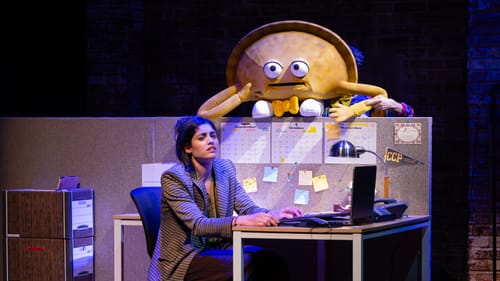Stay in the Loop
BSR publishes on a weekly schedule, with an email newsletter every Wednesday and Thursday morning. There’s no paywall, and subscribing is always free.
Who gets to be selfish?
Philadelphia Theatre Company and Edgewood Entertainment present Erlina Ortiz’s La Egoísta

Philadelphia Theatre Company (PTC) focuses this season on plays by Philly writers for Philly audiences, kicking off with the local premiere of Erlina Ortiz’s La Egoísta (winner of the National Latine Playwrights Award), produced in association with Edgewood Entertainment. This show about two very different sisters asks what it means to be selfish and who is allowed to be selfish.
Directed here by Tatyana-Marie Carlo, La Egoísta follows Josefina (Sasha Merci) and her younger sister Betsaida (María Gabriela González) as they navigate the aftermath of their mother’s death. Following years of outsized responsibility in their childhood home, Josefina leaves home at 17. At 30, her career as a standup comedian is just getting some momentum when her sister, who had been their mother’s primary palliative caregiver, suddenly becomes ill and needs caretaking herself. Josefina’s big personality, irreverent sense of humor, and intentional distance from their late mother contrast with Betsaida, who’s a dutiful daughter, diligent employee, and passionate Jehovah’s Witness.
“Selfishness” for women of color
Ortiz (who is also the co-artistic director of Philly’s Power Street Theatre) explores how two siblings raised in the same household can have such different experiences and memories of childhood and asks how we find the balance between selflessness and selfishness without losing ourselves. (Check out the BSR Podcast interview with Ortiz here.)
As a femme-socialized woman of color, I feel like there is an expectation of selflessness in family settings and communities. While boys and men can be self-focused and are praised for being career-driven, women are criticized for being selfish if they prioritize themselves. As Josefina says in one of her standup monologues, immigrant parents don’t have a 401k: they have kids, and that is their retirement plan. The most powerful moments in this play explore sisterhood and family obligation. There is also passing commentary about the US healthcare system (insurance being tied to employment, the dizzying charges on hospital bills, and the impossibility of getting timely care), but this isn’t the main focus.
Two powerful performances
The play mixes more traditional onstage drama with standup sets by Josefina, who bares it all and processes her emotions through her comedy. Some of this material is a miss. I couldn’t tell if that’s intentional since Josefina is an early-career comedian or if the lack of comedic chops is a shortfall of the script. The lack of laughs in some of the sets is made up in part by Merci’s powerful performance, timing, and physical comedy as Josefina. She has a great stage presence and is extremely engaging as a performer.
González also shines in an understated role with wide-ranging emotions. She realistically portrays the tension of chronic illness: desperately wanting to go and do things (in her case, spend time with her beloved congregation) versus her condition’s intense gravitational pull toward bed. A less skillful actor could have been overshadowed by Merci’s more flamboyant character, but the two find a good rhythm and dynamic with each other.

Puppets and PTC
To me, the show’s main weakness is the use of puppets (designed and built by the Rockshop, a New York-based puppetry, prop, and scenic workshop). When Betsaida is so hungry due to her illness that she starts to hallucinate, she sees other characters as food—a hot dog and a pastelito. A doctor appears as a cat. Perhaps the puppets attempt to interject levity or allude to the stress of being in constant pain, but they seem out of place with the play’s overall tone. (Theatre Exile’s 2022 Wolf Play was a better example of success in this vein.) But puppeteer Marisol Rosa-Shapiro does an excellent job integrating the puppets with humor and wit. Rodrigo Escalante’s effective scenic design transforms the stage from comedy club to sterile hospital room to dusty suburban home.
Despite some missed jokes, La Egoísta ranks as the best show I’ve seen at PTC. I hope it continues onto other stages, and I hope PTC continues to platform local talent after this season.
At top: Sasha Merci as Josefina in La Egoísta at PTC. (Photo by Mark Garvin.)
What, When, Where
La Egoísta. By Erlina Ortiz, directed by Tatyana-Marie Carlo in association with Edgewood Entertainment. $25-$70. Through October 20, 2024, at the Suzanne Roberts Theatre, 480 S Broad Street, Philadelphia. (215) 985-0420 or philadelphiatheatrecompany.org.
Accessibility
The Suzanne Roberts Theatre is a wheelchair-accessible venue. There will be an ASL-interpreted performance of La Egoísta on Thursday, October 17, and an open-captioned performance on Saturday, October 19. There will be free childcare at the Sunday, October 20, matinee.
Sign up for our newsletter
All of the week's new articles, all in one place. Sign up for the free weekly BSR newsletters, and don't miss a conversation.

 Krista Mar
Krista Mar